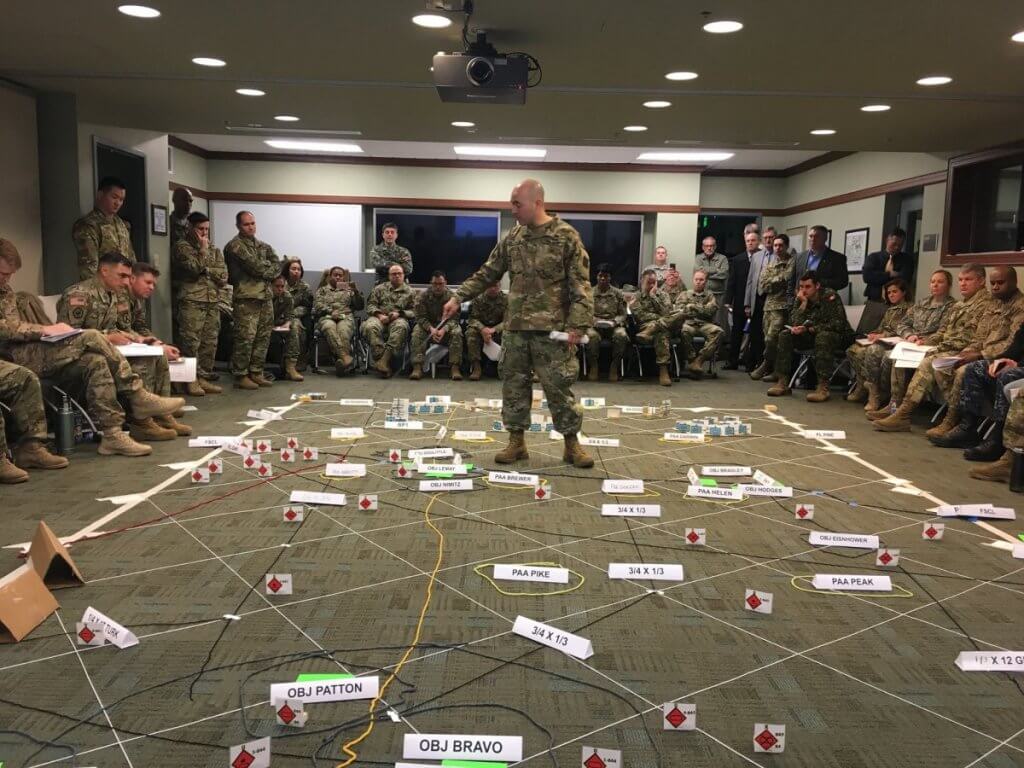Bottom line is, there is never a good time to take Army schools. There are always other events in our lives — i.e. family events, other Army trainings and civilian schools that make us not want to add anything to our already busy lives, especially when the Advanced Operations Course (AOC) is not required to advance past lieutenant colonel. I had these same reservations until I talked with my BDE S3, who told me that AOC was the best Army school he has ever taken.
I took stock of my S3’s recommendation, talked it over with household 6 and, even in a deployment year, I took the leap and signed up for AOC. I will tell you after almost seven months into AOC, my BDE S3 was not wrong.
AOC is without a doubt one of the most useful schools I’ve taken in my 22-year Army career. It takes everything that you’ve already learned as a basic staff officer and elevates it to the next level. The course teaches you how to think and react as a staff officer serving on a “general staff conducting unified land operations in a joint, interagency, intergovernmental and multinational environment,” according to the US Army Command and General Staff College. Most officers, whether it be Comp 1, 2 or 3, will spend time on a general staff and knowing how to conduct the operations process — in deployment offensive and defensive operations — is critical to success in those positions.
So enough of the Army pitch, what is it actually like to take the course?
First, it is structured in blackboard very similar to ILE, with quizzes, readings and module papers. What makes AOC different than ILE (which I did online as well) is the small class size (18 officers in my class) and the one-on-one instructor interaction, that remains throughout the course.
Also, AOC is different that ILE in that you have to work group projects and act in a range of general staff officer roles (outside of your branch) for various operations process scenarios. It forces you to learn other branch roles/functions and with the help of other officers in your class, who bring varying levels of experience to the table, everyone learns something from their peers.
In my opinion, the biggest thing that sets AOC apart is the professionalism and understanding from your instructor and other class members. For example, COVID-19 and hurricane season hit during my AOC class, and the instructor was very understanding with distributing the group work to account for these events and for other group members who were deployed. My class members were very understanding and more than happy to pick up the slack during those group projects.
For some instances, you may be the lead on certain group projects and have the majority of the slide briefing to pull together by corralling the other staff members. However, if things come up and you need to take a step back because of outside events (or COVID-19/ hurricanes), the group members will fill the gaps.
AOC is not meant to crush you and take away your free time. Its goal is to teach you critical general staff officer skills by learning and collaborating amongst the class and instructor. My class members have been nothing but accommodating and professional to work with. The instructor is always available for questions and or guidance, and in my opinion is very fair when grading assignments.
So, with all that being said the question should change from why take AOC to why not take AOC? The course is structured for you to learn and succeed, and the skills taught in the course will be invaluable in your Army career. If I signed up for AOC during a deployment year, took the course during the coronavirus pandemic and three hurricanes, you can too. Take the plunge don’t be afraid and enjoy it!
ABOUT THE AUTHOR: Maj. Paul Dangelantonio has spent 20 years in the Army and currently is a Signal Officer in the Pennsylvania National Guard. He spent eight years on active duty and the rest in the Pennsylvania National Guard. He has held every position from Signal Platoon Leader, Signal Company Commander, Battalion and Brigade Communications Officer. He currently serves as the 28th Expeditionary Combat Aviation Brigade and is currently deployed to Al Asad Air Base in Iraq.
He has been married for over 11 years and has two sons that live in West Grove Pennsylvania. He is a student in the Command and General Staff College Advanced Operations Course.

